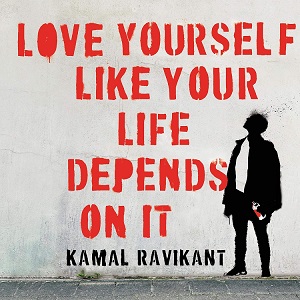Kamal Ravikant’s Love Yourself Like Your Life Depends on It is a powerful self-help guide that centers on the transformative power of self-love. Ravikant shares personal experiences, insights, and a practical framework to help readers cultivate self-love, overcome emotional struggles, and find inner peace. The book is rooted in the idea that loving yourself is not just a feeling but a practice—a habit that can be developed and maintained through intentional action.

Also read: Choose Yourself!
1. The Importance of Self-Love
The foundational lesson in the book is that self-love is essential for a fulfilling and healthy life. Ravikant explains that loving oneself isn’t an act of selfishness or arrogance, but rather a vital component of mental, emotional, and even physical well-being. By practicing self-love, individuals can combat negative thoughts, break free from self-destructive patterns, and build resilience.
Key Lesson: Loving yourself is the cornerstone of personal happiness and well-being. It creates a foundation for overcoming challenges and living a meaningful life.
2. The Power of Repetition and Affirmation
Ravikant emphasizes the power of repetition in shaping the mind. One of his core practices is the repetition of the simple phrase, “I love myself.” By continuously affirming this statement, the mind begins to accept it as truth. Over time, these affirmations replace negative thought patterns with positive, self-affirming beliefs, creating a profound mental shift.
Key Lesson: Repetition of positive affirmations, like “I love myself,” rewires the brain and helps you break free from negative thoughts.
3. The Practice of Self-Love Meditation
Meditation is a key technique Ravikant shares for cultivating self-love. His meditation practice involves focusing on the breath and mentally repeating the affirmation, “I love myself.” This technique not only quiets the mind but also helps anchor the belief of self-love into the subconscious. By meditating regularly, individuals can strengthen their mental and emotional connection to self-love.
Key Lesson: Practice meditation to internalize self-love. Combining focused breathing with positive affirmations creates a deep sense of inner peace and love.
4. Embracing Vulnerability and Healing
Ravikant talks about the importance of embracing vulnerability as a path to healing. He acknowledges that life brings pain, but it’s essential to face it rather than suppress it. By being vulnerable with oneself—admitting pain, fears, and insecurities—you create space for healing. Self-love becomes the tool through which you can acknowledge your wounds and begin to heal them.
Key Lesson: Embrace vulnerability as part of the healing process. Self-love allows you to face your pain and begin to heal emotionally.
5. The Power of Letting Go
Another key theme is the importance of letting go of negative emotions, past hurts, and self-judgment. Ravikant encourages readers to practice releasing the baggage of past experiences that no longer serve them. By letting go of grudges, regrets, and self-critical thoughts, individuals can make room for love, growth, and positive energy in their lives.
Key Lesson: Let go of negative emotions and past hurts. Free yourself from the emotional baggage that holds you back from living fully.
6. Commitment to Self-Love
Ravikant stresses that self-love is a commitment. It’s not a one-time event but a daily practice that requires conscious effort. He describes self-love as a choice—one that needs to be reaffirmed every day, even when it feels difficult. By committing to self-love, individuals take control of their emotional state and overall well-being.
Key Lesson: Self-love is a daily commitment. You must consciously choose to love yourself every day, even when it feels hard.
7. Cultivating a Self-Love Habit
Ravikant offers practical tips for making self-love a habit. He recommends simple daily actions like writing “I love myself” repeatedly in a journal, saying it aloud in front of a mirror, or setting reminders throughout the day to focus on self-love. By incorporating these small, consistent actions into daily life, self-love becomes a natural and automatic habit.
Key Lesson: Turn self-love into a habit by practicing it daily through journaling, affirmations, and mindful reminders.
8. Facing Fear and Self-Doubt
A powerful message in the book is learning to face fear and self-doubt head-on. Ravikant shares that fear and self-doubt are normal human experiences, but they don’t have to control your life. By acknowledging these emotions and responding to them with self-love, you can diminish their power and build confidence in yourself.
Key Lesson: Face fear and self-doubt with self-love. Acknowledge these feelings but don’t let them define your worth or actions.
9. The Healing Power of Self-Compassion
Alongside self-love, Ravikant emphasizes the role of self-compassion in the healing process. He encourages readers to be kind to themselves, especially when they make mistakes or face challenges. Instead of criticizing yourself, respond with kindness and understanding. Self-compassion creates a safe emotional space for growth and transformation.
Key Lesson: Be compassionate with yourself. Practice kindness and understanding toward yourself, especially in times of difficulty.
10. The Ripple Effect of Self-Love
One of the most profound lessons in the book is that self-love doesn’t just transform your inner world—it has a ripple effect on your external life. When you love yourself, you attract healthier relationships, make better decisions, and live with more purpose. Self-love also allows you to love others more fully, as it stems from a place of wholeness rather than need.
Key Lesson: Self-love has a ripple effect. It improves your relationships, decisions, and ability to love others from a place of wholeness.
Conclusion
Kamal Ravikant’s Love Yourself Like Your Life Depends on It provides a simple yet powerful blueprint for emotional healing and personal growth through the practice of self-love. By committing to daily affirmations, meditation, and self-compassion, individuals can transform their inner dialogue, break free from negative patterns, and build a more fulfilling, joyful life. The book’s central message is clear: loving yourself is not only essential but also achievable through conscious, consistent effort (Amazon).


